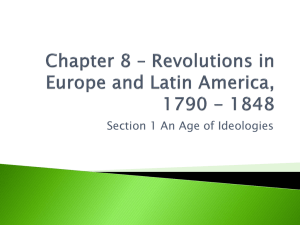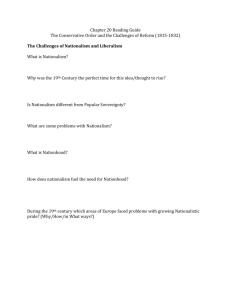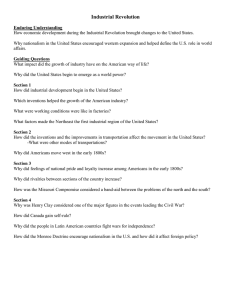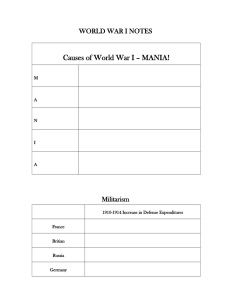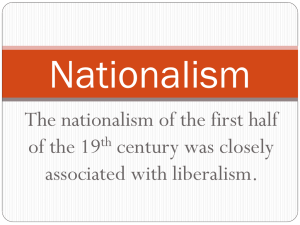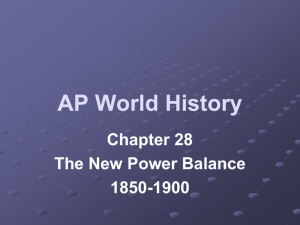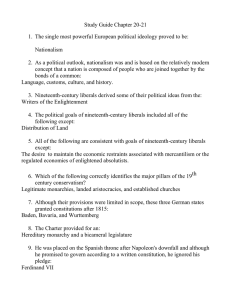Conservative Order & Reform Reading Guide
advertisement
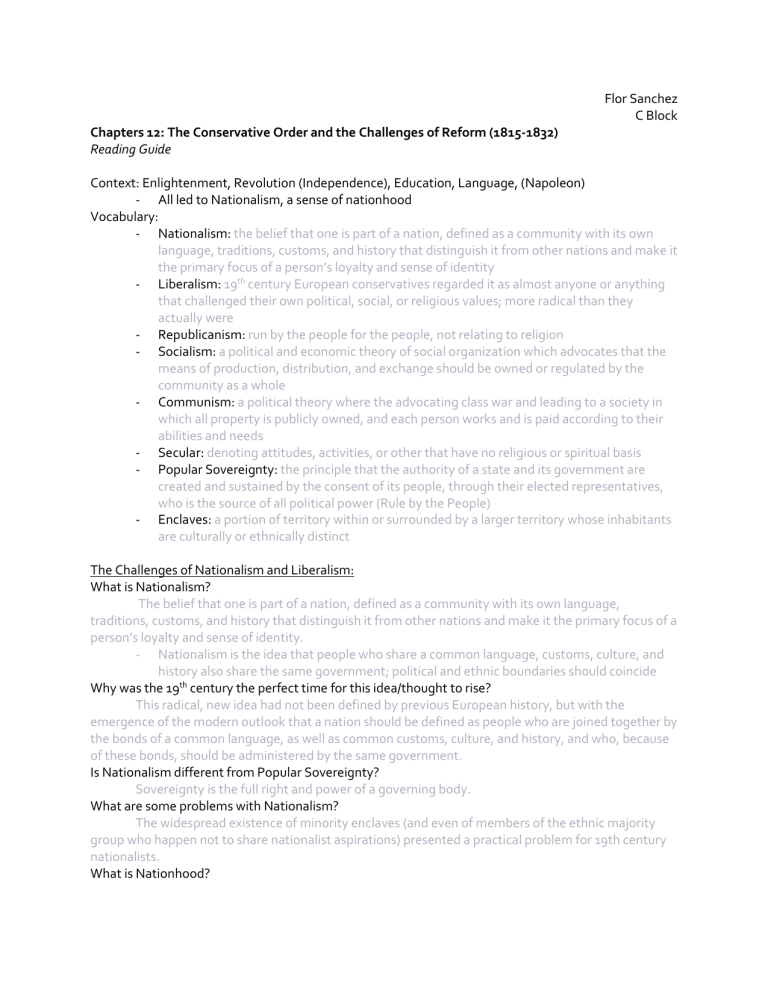
Flor Sanchez C Block Chapters 12: The Conservative Order and the Challenges of Reform (1815-1832) Reading Guide Context: Enlightenment, Revolution (Independence), Education, Language, (Napoleon) - All led to Nationalism, a sense of nationhood Vocabulary: - Nationalism: the belief that one is part of a nation, defined as a community with its own language, traditions, customs, and history that distinguish it from other nations and make it the primary focus of a person’s loyalty and sense of identity - Liberalism: 19th century European conservatives regarded it as almost anyone or anything that challenged their own political, social, or religious values; more radical than they actually were - Republicanism: run by the people for the people, not relating to religion - Socialism: a political and economic theory of social organization which advocates that the means of production, distribution, and exchange should be owned or regulated by the community as a whole - Communism: a political theory where the advocating class war and leading to a society in which all property is publicly owned, and each person works and is paid according to their abilities and needs - Secular: denoting attitudes, activities, or other that have no religious or spiritual basis - Popular Sovereignty: the principle that the authority of a state and its government are created and sustained by the consent of its people, through their elected representatives, who is the source of all political power (Rule by the People) - Enclaves: a portion of territory within or surrounded by a larger territory whose inhabitants are culturally or ethnically distinct The Challenges of Nationalism and Liberalism: What is Nationalism? The belief that one is part of a nation, defined as a community with its own language, traditions, customs, and history that distinguish it from other nations and make it the primary focus of a person’s loyalty and sense of identity. - Nationalism is the idea that people who share a common language, customs, culture, and history also share the same government; political and ethnic boundaries should coincide Why was the 19th century the perfect time for this idea/thought to rise? This radical, new idea had not been defined by previous European history, but with the emergence of the modern outlook that a nation should be defined as people who are joined together by the bonds of a common language, as well as common customs, culture, and history, and who, because of these bonds, should be administered by the same government. Is Nationalism different from Popular Sovereignty? Sovereignty is the full right and power of a governing body. What are some problems with Nationalism? The widespread existence of minority enclaves (and even of members of the ethnic majority group who happen not to share nationalist aspirations) presented a practical problem for 19th century nationalists. What is Nationhood? Nationhood is the fact or status of being a nation; national identity or independence. It came to be associated with groups that were large enough to support a viable economy, that successfully claimed a significant cultural history, that possessed a cultural elite that could nourish and spread the national language, and that had the military capacity to conquer other peoples or to establish and protect their own independence. How does nationalism fuel the need for Nationhood? With the influence of general, common ground to a group that all believers can relate to, nationalism eventually rose. For example, the Third Estate, which was pretty much all of the people other than the clergy and wealthy, make up the whole of France. The sense of nationhood leading up to nationalism and liberalism to the working class, or conservative ordered, highly appealed to the whole of the country, and thus, this movement emerged. During the 19th century, which areas of Europe faced problems with growing Nationalistic pride? (Why/How/in what ways?) Nationalists challenged the political status quo throughout Europe. - Although England bought Ireland under direct rule in the 1800s, Ireland nationalists wanted independence or at least larger measures of self-government rather than the Irish electing members to the British Parliament in Westminster - German nationalists sought political unity for all German-speaking peoples, challenging the legitimacy of the Prussian and Austrian monarchies, which both contained large nonGerman-speaking populations - Italian nationalists sought to unify Italian-speaking peoples on the Italian peninsula and to drive out their Austrian and Bourbon rulers - Polish nationalists, targeting primarily their Russian rulers, struggled to restore Poland as an independent nation Compare and Connect: Mazzini and Lord Acton (p. 434-435) Who is Giuseppe Mazzini and where was he from? Giuseppe Mazzini was an Italian nationalist who combined a generally democratic view of politics with a religious concept of the divine destiny of nations. What qualities of a people does Mazzini associate with Nationalism? A nation is an association of those who are brought together by language, by given geographical conditions or by the role assigned them by history, who acknowledge the same principles and who march together to the conquest of a single definite goal under the rule of a uniform body of law. - Common ideas, common principles, and a common purpose - Logically derived and vigorously applied principles its means; the strength of all its strengths; the improvement of the life of all and the happiness of the greatest possible number its results; and the accomplishment of the task assigned to it by God its goal How and why does Mazzini relate nationalism to divine purposes? Mazzini states that nationalism should also consist in the share of mankind’s labors which God assigns to a people. This mission is the task which a people must perform to the end that the Divine Idea should be realized in this world; it is the work which gives a people its rights as a member of mankind; the baptismal rite which endows a people with its own character and its rank in the brotherhood of nations. Who is Lord Acton and where was he from? Lord Acton was an important 19th century commentator on contemporary religious and political events as well as a historian. He was from Naples, Italy. Why does Acton see the principle of nationality as dangerous to liberty? He states that by making the state and the nation proportionate with each other in theory, it reduces practically to a subject condition all other nationalities that may be within the boundary. It cannot admit them to an equality with the ruling nation which constitutes the State, because the State would then cease to be national, which would be a contradiction of the principle of its existence. Why does Acton see nationalism as a threat to minority groups and to democracy? Minority groups may not have the same culture, religion, or language as the ruling nation, and so if forced to adapt to them, it would not show a sense of pride and nationalism and instead show inequality in the way that there is no nationalism. It contradicts the whole system of being a nation. How might the connection that Mazzini draws between nationalism and divine will serve to justify the repression of minority rights that Acton feared? The divine right to rule by which one is appointed by God, or a god for certain people, will not apply to everyone the way it does for said group. If it does not include the same religion, tradition, or customs, it is therefore not a nation and it would contradict the whole idea of nationalism. Early 19th Century Political Liberalism: Define the word liberal: 19th century European conservatives regarded it as almost anyone or anything that challenged their own political, social, or religious values; more radical than they actually were. What were some of the goals of political liberal across Europe? What did they hope to gain? How did they attempt to gain power? Liberals sought to establish a political framework of legal equality, religious toleration, and freedom of the press. Their general goal was a political structure that would limit the arbitrary power of government against the persons and property of individual citizens. Liberals sought to achieve political arrangements through written constitutions. They wanted to see constitutionalism and constitutional governments installed across the Continent. What were some of the economic goals of liberals across Europe? Liberals wanted to extend representation to the propertied classes. Second only to their hostility to the privileged aristocracies was their contempt for the lower, unpropertied classes. They imaged an active citizenry of educated men, inspired by reason and by their own investment, through their private property, in peace and stability. - Transformed the 18th century concept of aristocratic liberty into a new concept of privilege based on wealth and property rather than on birth - Liberals wanted an economic structure in which people were at liberty to use whatever talents and property they possessed to enrich themselves o Would produce more goods and services for everyone at lower prices and provide the basis for material progress Did all European countries have the same economic and political goals? Why or why not? No, as there were countries who were more relatively conservative rather liberal. Specific programs of liberals differed from one country to another. The problem for liberals was to protect civil liberties, define the respective powers of the monarch and the elected legislature, and expand the electorate moderately while avoiding democracy. Who is Benjamin Constant? What did he seek during the 19th century? Benjamin Constant is a French liberal theorist. Is there a connection between liberalism and nationalism? If so, what is it? No, as some liberals were more tolerant of a strong state and monarchical power than other liberals were and believed that unification would lead to a freer social and political order. Nationalism consists of people in a nation who act as a community, sharing the same language, traditions, customs, and history. That is what really makes nationalism stand out from others, as one acts as a whole group whereas liberals are mainly the wealthy who feel oppressed. - They were often compatible though; nationalist groups in one country could gain the support of liberals elsewhere in Europe who might not otherwise share their nationalist interests Conservative Governments: the Domestic Political Power: How does this book define conservatism? Support for the established order in church and state. In the 19th century, it implied support for legitimate monarchies, landed aristocracies, and established churches. Conservatives favored only gradual, or “organic,” change. How did monarchies and aristocracies across Europe interpret the execution of King Louis XVI? How did the church carry on after the revolution? The execution of Louis SVI at the hands of radical democrats convinced most monarchs they could trust only aristocratic governments or governments of aristocrats in alliance with the wealthiest middle-class and professional people. The European aristocracies believed that no form of genuinely representative government would protect their property and influence. The Churches equally distrusted popular movements, except their own revivals. Ecclesiastical leaders throughout the Continent regarded themselves as entrusted with the educational task of supporting the social and political status quo. What countries were forming alliances? - The Congress of Vienna following the age of Napoleon redistributed land and created tension between European powers - Countries formed alliances to protect themselves from any one singular power Quadruple Alliance: The Low Countries: The Great Powers: Britain, Austria, Prussia, Russia Belgium, Holland Russia, Britain, Prussia, France, Austria The Holy Alliance: German Confederation: Austria, Prussia, Russia German, Hungarian, Polish, Czech, Slavs, Slovene, Italian, Croat, Romanian, Serbs Who is Prince Metternich? Where was he from? As a conservative, what did he urge European monarchs to do? Prince Metternich, the chancellor of Austria, believed that preventing domestic unrest was the key to maintaining international peace. He is the chief architect of the Vienna settlement along with a loyal servant of the Habsburg emperor. - Exercised chief control over the forces of European reaction and who, more than any other early 19th century statesman, epitomized conservatism - Had his own strict enforcement Explain the Carlsbad Decree of 1819: (conservative) - Metternich persuaded major German states to issue this o Dissolved the Burchenschaften o Provided for university inspectors and press censors o Trying to get the German Confederation to shape up and contain their nationalists Postwar Repression in Great Britain: Who is Lord Liverpool and what did he do? - Tory ministry of Lord Liverpool was unprepared to deal with problems of postwar dislocation o Sought to protect the interests of the landed and wealthy classes o Passed the Corn Laws What were the Corn Laws of 1815? Parliament passed a Corn Law to maintain high prices for domestically produced grain (called “corn” in Britain) by levying imports on foreign grain. - Protected the wealthy businesses - Conservative move How did the British government treat its people? - “Poor Laws:” social welfare - Poor harvests and unemployed military leads to unrest What were the Coercion Acts of March 1817? The Coercion Acts of 1817 made it illegal for any group of people to assemble and meet. - Liverpool did not want any protests What was the “battle” of Peterloo? What was the final outcome? - Protest in Manchester 1819 o People went to St. Peter’s fairground to protest peacefully o Local government sent in the military to squash the rebellion o Ended up being a massacre; speakers and innocent people were killed Explain the Six Acts and the impact on the people: - From the Peterloo battle 1. No large meetings (people were unable to meet up and discuss problems of the government) (Violation of a basic human civil right) 2. Increasing money libel (false accusations and the right to sue the group who violated them); heresy 3. Speedy trials for political activists (Liverpool arrested people who spoke ill of the government) 4. Increasing newspaper tax (heavy tax for newspaper) (Lord Liverpool trying to squash the rebellion by making it so people were unable to buy the newspaper with commentators and opinions) 5. Prohibit training of militia (decreased local power) 6. Allow for search and seizures (right to barge into homes) - Conservative move Bourbon Restoration in France: Who are the Bourbons? How were they able to attain power? The abdication of Napoleon in 1814 opened the way for the restoration of Bourbon rule in the homeland of the great revolution. The new king was the former count of Provence and a brother of Louis XVI. How did Louis XVIII rule France? - “constitutional monarch” - The Charter; provided hereditary monarchy and a bicameral legislature - Uphold Declaration - Does not question land holdings o Appease revolutionaries; does not want to anger them Who are the Ultra-royalists? What effect did they have on the French monarchy? - Ultraroyaltists: aristocracy who stuck around during France; wanted power, nobility, led by Bourbon family members - - Scandals and assassinations in Chamber of Deputies (House of Commons) o Ultraroyaltists told Louis that it was because he allowed liberals to be part of the government; liberals wanted to take over Revealed the basic contradiction of the French restoration The Conservative International Order: What is the Concert of Europe? How is it relevant? - Term applied to the European great powers acting together (in “concert”) to resolve international disputes between 1815 and the 1850s - Prevented one nation from taking a major action in international affairs without working in concert with and obtaining the assent of the others - New steps to regulate international relations Explain the Congress System and how European countries worked together: - A series of international meetings among the European great powers to promote mutual cooperation between 1818 and 1822 - Mutual cooperation and consultation - Four major powers removed their troops from France, which had paid its war reparations, and readmitted France to good standing among the European nations The Spanish Revolution of 1820: Explain the relationship between France and Spain: - France sent to snuff out Spain and their Revolution o Did it w/o conquering the land for themselves How did alliances across Europe influence the Spanish revolution? - Met up to stop the Spanish Revolution o Wanted to keep order established in Vienna What was the Congress of Verona? The last of the meetings held by the European powers in accordance with the terms of the Quadruple alliance (1815) between Russia, Prussia, Austria, and Great Britain. - Last effective manifestation of the Holy Alliance - Held to consider the revolutionary situation in Spain - Convened because the French king Louis XVIII wanted his allies’ consent to intervene in Spain to overthrow the constitutional regime established there in 1820; congress agreed to support France if it should be attacked by Spain Revolt against the Ottoman Rule in the Balkans: What was the Ottoman Empire? - Land for the taking What happened in Greece during the 1820s? - Historical significance - Trying to gain its independence in the 1800s o 1827 Treaty of London; gains independence from the Ottoman Empire Were there any other European countries willing to help Greece? Why or why not? - Britain, France, and Russia agree - Meet in London draft this treaty; demand Turks to recognize Greece o 1830, 2nd Treaty is drafted after the Turks deny the first but give into the second o “Romantic Ideals” originated from here o Save the idea of democracy How did Serbia gain its independence? Was it an easy fight? - 1830 Serbia gains independence - “Friend” of Russia o Both are part of the Eastern Orthodox, share Slavic population Who did they gain their independence from? - Russia Wars of Independence in Latin America and South America: What caused the “shake up” in Latin America? - 1804-1824: Decolonization; end of “transatlantic” government - European countries are leaving the Americas or Natives themselves are fighting off European colonists Summarize the Revolution in Haiti; who, what, when, why, and how did it start; what was the overall impact? - France loses Haiti Who are the creoles and what did they want? How did they revolutionize South America? - Creole elites: merchants, landowners, and professional people of Spanish descent but who were born in the colonies o Lead revolts o Fair trade What happened in Argentina? Who was involved? - The first region to assert itself; known at the time as Río de la Plata - Buenos Aires was the center of revolt where citizens fought off a British invasion and then learned they did not need Spanish assistance - The junta put off Spanish authority and sent forces to Paraguay and Uruguay o Tried to liberate them from Spain; armies were defeated but Spain had lost control of both areas o Paraguay asserted its own independence whereas Brazil took over Uruguay Summarize the Revolution in Venezuela; who is Simon Bolivar and what did he do? - Bolivar (liberal, republic): him and his groups liberated Columbia, Bolivia, Peru, Ecuador, Venezuela o Involved in the organization of a liberating junta in Caracas, Venezuela; firm advocate of both independence and a republic - 1811-1814: civil war broke out throughout Venezuela as both royalists on one hand and salves and cowboys on the other challenged the authority of the republican government o Bolivar had to go into exile and in 1816, with help from Haiti, returned to the continent o Captured Bogotá, Columbia, Bolivia, and Ecuador to secure a base for an attack on Venezuela o Captured Caracas and was named president How did Brazil gain their independence and from who? - The Portuguese royal family and several thousand government officials and members of the court fled to Brazil in 1807 - Immediately transformed Rio de Janeiro into a royal city - 1815, the regent João made Brazil a kingdom o No longer regarded as a colony of Portugal - 1820: revolution in Portugal, and its leaders demanded João’s return to Lisbon o Left his son, Dom Pedro, as a regent in Brazil o - September 1822: Dom Pedro embraced the cause of Brazilian independence against the recolonizing efforts of Portugal o Became emperor of an independent Brazil Achieved independence in a way that left no real dispute as to where the center of political authority lay The Conservative Order Shaken in Europe: - European Revolutions of 1820s and 1830s - Russia: the Decembrists Revolt of 1825 (army did not want to carry out the orders of Nicholas; Nicholas carried out the trials of the traitors; failed revolt, just wanted to get rid of Nicholas but did not have enough support) Describe Russia prior to the revolution: (the people, the problems, the monarchy, etc.) - Dynastic problems - Experiences national sentiment o Coups and death - “Southern Society:” secret society of nationalists Summarize the Dynastic Crisis; who died, who took control, and who was left out: - Alexander I died and left two choices o Constantine; the ruler of Poland People wanted this liberal ruler Couldn’t rule because his wife was Roman Catholic and refused to convert Did not force his wife to convert or change the laws to become king o Nicholas, an unpopular ultraconservative, took control What did Nicholas I bring to Russia? What did he do for the people? - Nicholas: ultraconservative, unpopular - “Orthodoxy, Autocracy, and Nationalism” - Alienates “western” world - 1830 Polish Revolt o An attempt at a revolt - 1832 “Poland Official part of Russia” o Rose but up then was quickly crushed Revolution in France 1830: Was Charles X good or bad, and why? - Bad; repressive measures which led to rioting in Paris and the abdication of Charles in the summer of 1830 o Caused a rift between radicals who wanted to establish a republic, and the bourgeoisie who wanted the stability of a monarchy What was the Chamber of Deputies? - The lower house of the two-chamber French legislature that was created in 1814 by Louis XVIII’s constitution o Pressured by Parisian mobs to proclaim a republic and to name a provisional government that would rule temporarily until a Constituent Assembly, conflicts between the government and socialist and radical workers erupted into bloody class battles on the streets of Paris by early summer 1848 - Provinces elected a largely conservative Constituent Assembly, conflicts between the government and socialist and radical workers erupted in bloody class battles on the streets of Paris by early summer 1848 Summarize the July Revolution; what happened to Charles and to France? - Students were massacred and the bourgeois king (Louis Phillippe) was placed up on the throne, resulting in no gains for the movement - 1830, liberals win majority in House of Chambers - 4 Ordinances o Dissolve House o Cens or press o Enfranchisement of wealthy o New elections - Charles X abdicates -> exiled - Louis Philippe became the King of the people Who is Louis Philippe? Why was he so different than other/past French monarchs? - An aristocrat; became the “bourgeoisie king” - Dressed like a normal person and shook hands with others - Gave back the Tri-color flag o Appealed to liberals - BUT: o Legislation still conservative o No sympathy for the working class - Rampant corruption in the government as he incited republic and socialist protests, which erupted in violence - Abdicates to nephew in February 1848 What happens after Philippe? - Belgium revolted against the Dutch in 1830 and became a constitutional monarchy How did the new French government fair against its colonies abroad? - Revolution in France sparked revolutions throughout Europe Belgium’s Independence How did this happen? Who do they defeat to gain independence? What does that mean for Europe? - The former Austrian Netherlands, Austrian had been merged with the kingdom of Holland in 1815 o Differed in religion, language, and economy, however, and the Belgian upper classes never reconciled themselves to Dutch rule - August 25, 1830: disturbances broke out in Brussels after the performance of an opera about rebellion in Naples against Spanish rule o Municipal authorities and people from the propertied classes formed a provisional national government to end the rioting o Compromise between the Belgians and Dutch failed; King Willian I of Holland sent troops and ships against Belgium - November 10, 1830: the Dutch had been defeated, a national congress wrote a liberal Belgian constitution, which was issued in 1831 The Great Reform Bill: Britain 1832: (p. 454) What was the Reform Bill of 1832? What did it state? - Widened the franchise and gave a broader section of Britain’s population a stake in the existing political system - Abolished the rotten boroughs, expanded the electorate and empowered the industrial middle class o Rotten boroughs; giving industrial areas representation; gave the people voting and were able to go to the House of Commons - Commercial policies - Liberal act Was it difficult to put into law? - Commercial and industrial class was larger in Britain than in other countries - Britain’s liberal Whig aristocrats (who regarded themselves as the protectors of constitutional liberty) had a long tradition of favoring moderate reforms that would make revolutionary changes unnecessary - New members of the government believed it had to accommodate itself to the changing social and economic life of the nation o Favored greater economic freedom and repealed the Combination Acts that had prohibited labor organizations Explain the role of the House of Commons: - The lower chamber of Parliament - Many of the boroughs that elected representatives to Parliament in fact no longer existed, while large and growing industrial cities had no representation at all - Created to give voting rights and representation to industrialized areas What is the Catholic Emancipation Act? How does this affect the Empire of Great Britain? (think specifically Ireland, Scotland, and England) - English determination to maintain the union with Ireland o England’s relationship to Ireland was similar to that of Russia to Poland or Austria to its several nation groups - 1800: England was fearful that Irish nationalists would revel again o William Pitt the Younger had persuaded Parliament to pass the Act of Union between Ireland and England o Ireland sent a hundred members to the House of Commons o Most of the Irish were Catholic; weren’t allowed to be Catholic in the House of Commons because of possible religious disputes o Catholic Emancipation got rid of this thinking - Prevent unrest in nation - Liberal act passed for the conservative purpose of preserving order in Ireland o Included a provision raising the property of qualification to vote in Ireland, so that only the wealthier Irish could vote - The vast majority of nationalists did not believe legitimate monarchies provide a basis for political unity The Carlsbad Decree instituted the repressive measures in the German Confederation o Metternich 19th century Liberalism is not associated with individualism The pillars of the 19th century conservatism did not include written constitutions The Burchenschaften in Baden, Bavaria, and Wittenberg were Student associations The Iron Law of Wages, discussing that as wages rose, people had more children was written by David Ricardo In their war of independence against the Ottoman Empire, the Greeks ultimately won the support of Great Britain, France, and Russia The liberation of Argentina was achieved by the armies of Jose de San Martin The Wars of Independence in South America were led by Creoles - The Russians established a special relationship with independent Serbia for all of the following reasons except continuation of its expansion policy in the region The Protocol of Troppau permitted stable governments’ intervention into countries experiencing revolution for the purpose of restoring order
